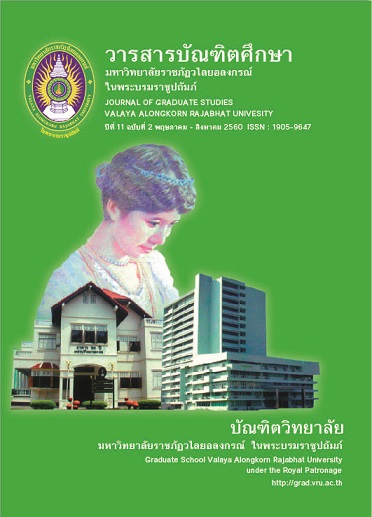การสังเคราะห์รูปแบบการเรียนรู้แบบร่วมมือโดยใช้เทคนิคกลุ่มผลสัมฤทธิ์ร่วมกับการเรียนรู้โดยใช้ปัญหาเป็นฐานแบบปรับเปลี่ยนด้วยเอเจนท์
Main Article Content
Abstract
บทคัดย่อ
การวิจัยนี้มีวัตถุประสงค์ เพื่อสังเคราะห์รูปแบบการเรียนรู้แบบร่วมมือโดยใช้เทคนิคกลุ่มผลสัมฤทธิ์ร่วมกับการเรียนรู้โดยใช้ปัญหาเป็นฐานแบบปรับเปลี่ยนด้วยเอเจนท์ และเพื่อประเมินความเหมาะสมของรูปแบบที่สังเคราะห์ขึ้น กลุ่มตัวอย่างเป็นผู้เชี่ยวชาญ จำนวน 12 คน ใช้วิธีการเลือกแบบเจาะจง มีคุณสมบัติคือ สำเร็จการศึกษาระดับปริญญาเอกด้านคอมพิวเตอร์ศึกษาหรือสาขาที่เกี่ยวข้องจากสถาบันอุดมศึกษา และมีประสบการณ์สอนและวิจัยด้านคอมพิวเตอร์ศึกษาหรือสาขาที่เกี่ยวข้อง ไม่น้อยกว่า 5 ปี เครื่องมือที่ใช้ในการวิจัย ได้แก่ รูปแบบการเรียนการสอนที่สังเคราะห์ขึ้น และแบบประเมินความเหมาะสมของรูปแบบฯ การวิเคราะห์ข้อมูลใช้สถิติค่าเฉลี่ย และส่วนเบี่ยงเบนมาตรฐาน ผลการวิจัยพบว่าองค์ประกอบที่สำคัญของรูปแบบ ประกอบด้วย 5 องค์ประกอบ ได้แก่ PBL Module STAD Module Group Module Agent และ Define Group โดยผู้เชี่ยวชาญมีความเห็นว่ารูปแบบการเรียนการสอนที่สังเคราะห์ขึ้นในภาพรวมอยู่ในระดับมากที่สุด ( = 4.53, S.D. = 0.57) เมื่อพิจารณารายละเอียดพบว่ารายการที่ผู้เชี่ยวชาญให้การยอมรับมากที่สุด คือ ขั้นตอนการจัดการเรียนรู้โดยใช้ปัญหาเป็นฐาน (
= 4.72, S.D. = 0.45) การยอมรับระดับมากที่สุด ส่วนรายการที่ผู้เชี่ยวชาญให้การยอมรับน้อยที่สุด คือ กรอบแนวคิดของรูปแบบการเรียนรู้สอดคล้องกับวัตถุประสงค์ของงานวิจัย (
= 4.08, S.D. = 0.67) การยอมรับระดับมาก สรุปได้ว่ารูปแบบการเรียนรู้ที่พัฒนาขึ้นมีความเหมาะสมระดับมากที่สุดสามารถนำรูปแบบที่สังเคราะห์ขึ้นไปใช้เป็นต้นแบบในการพัฒนาระบบได้
ABSTRACT
The objectives of this research are to synthesize the collaborative learning techniques to student team-achievement division with problem-based learning using adaptive classification by agent, and to evaluate the suitability of the synthesized model. The sample group of this research includes 12 experts who have a doctorate degree of computer education or relevant fields from higher education institutes, with over 5 years of teaching and researching experiences on computer education. The samples were selected under a purposive sampling method. The research tools used herein are the synthesized instructional model and the evaluation form thereof. The data were analyzed by mean and standard deviation. The results of the research show that there are 5 main elements on the model, i.e. PBL Module, STAD Module, Group Module, Agent, and Define Group. Thereby, the experts agree that the overall synthesized instructional model is at very high level (Article Details

This work is licensed under a Creative Commons Attribution-NonCommercial-NoDerivatives 4.0 International License.
บทความทุกเรื่องได้รับการตรวจความถูกต้องทางวิชาการโดยผู้ทรงคุณวุฒิ ทรรศนะและข้อคิดเห็นในบทความ Journal of Global of Perspectives in Humanities and Social Sciences (J-GPHSS) มิใช่เป็นทรรศนะและความคิดของผู้จัดทำจึงมิใช่ความรับผิดชอบของบัณฑิตวิทยาลัย มหาวิทยาลัยราชภัฏวไลยอลงกรณ์ ในพระบรมราชูปถัมภ์ กองบรรณาธิการไม่สงวนสิทธิ์การคัดลอก แต่ให้อ้างอิงแหล่งที่มา


